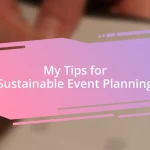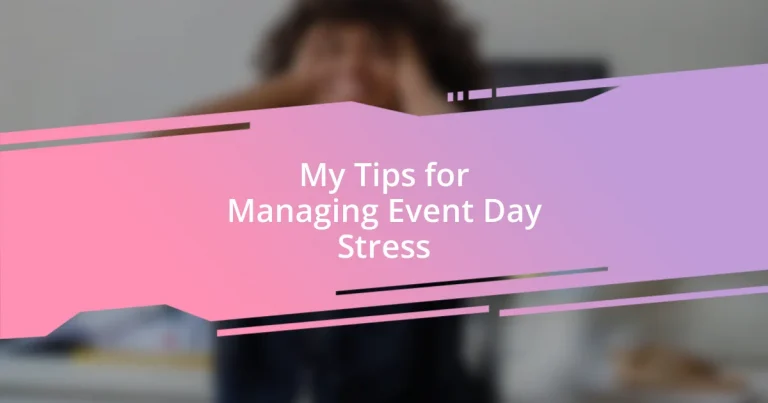Key takeaways:
- Recognize and manage event day stress by identifying triggers and accepting what is outside your control.
- Create a detailed event timeline and checklist to enhance organization, reduce anxiety, and manage tasks effectively.
- Foster open communication with your team and reflect post-event to gain insights and improve future planning.
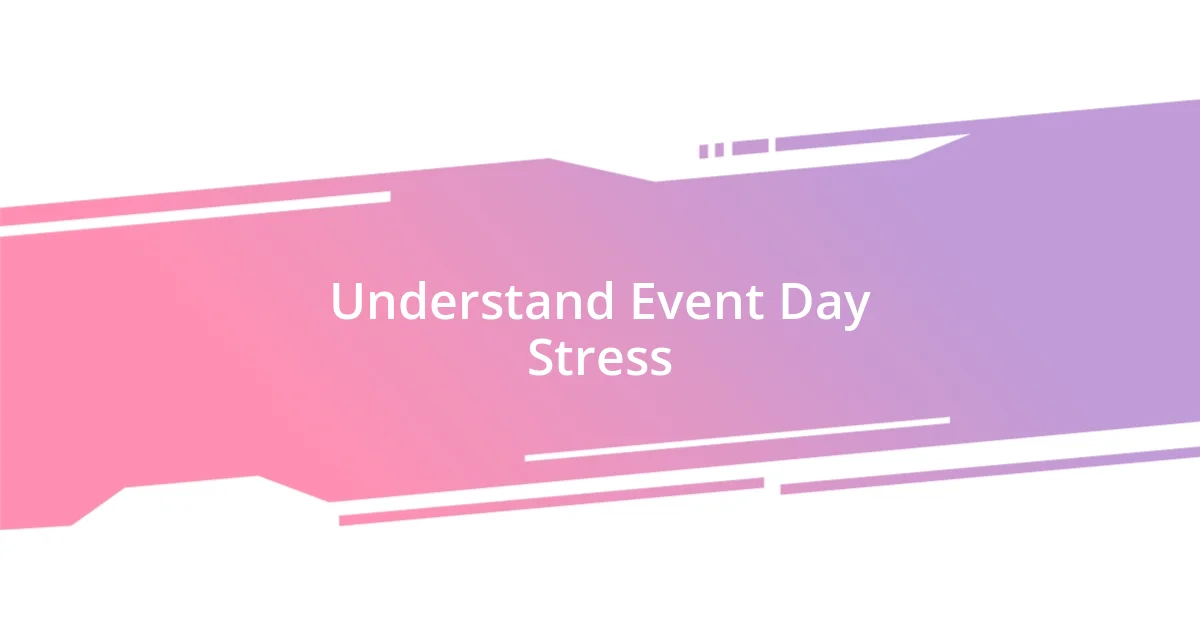
Understand Event Day Stress
Event day stress can feel overwhelming, almost like a crescendo building up in a symphony. I remember my first big event—my heart raced, and the flutter in my stomach felt like a constant reminder of the pressure. It’s important to recognize that this stress often stems from the weight of expectations, both self-imposed and external.
Navigating event day stress is a complex dance between excitement and anxiety. Have you ever felt that knot in your stomach when you realize the clock is ticking down? I’ve certainly been there, torn between wanting everything to be perfect and accepting that not every detail is within my control. Accepting this duality can be a game changer. It allows us to focus on what we can manage instead of spiraling into a whirlwind of worries.
Moreover, understanding event day stress means acknowledging its various triggers. For me, the chaos of last-minute preparations often amplified my anxiety. I’ve learned that identifying these stressors—like running late or technical difficulties—can turn a frantic mind into a more proactive one. What are your stress triggers? Pinpointing them is a crucial step toward mastering your emotional landscape on event day.

Plan Your Event Timeline
Planning an event timeline is one of the best strategies I’ve found for managing stress on the big day. I remember a particularly chaotic event where I had a detailed timeline in hand; it felt like my safety net. I could glance at it anytime and know exactly where I should be and what I needed to do next. This simple act of organization not only helped me stay on track, but it also eased my anxiety, turning those frantic moments into manageable chunks of time.
To create an effective event timeline, consider these key elements:
- Define Major Milestones: Identify critical moments, like the start of the event or guest arrivals.
- Allocate Time for Each Task: Make sure to give yourself enough time for setup, breakdown, and anything unexpected.
- Include Buffer Time: Life happens—so plan short breaks between tasks.
- Communicate with Your Team: Ensure everyone involved knows their responsibilities and timings.
- Review and Adjust: Walk through the timeline days before the event and tweak as necessary.
Establishing a clear timeline can transform the day from a series of uncertainties into a structured plan, alleviating that dreaded “What’s next?” feeling.

Create a Detailed Checklist
Creating a detailed checklist for your event is one of the most effective ways I’ve discovered to combat that overwhelming feeling on the big day. I still remember preparing for a large community gathering where I crafted a checklist detailing every aspect, from setup logistics to vendor contact information. It provided a sense of control and clarity, almost like a comforting guide through the chaos.
Another advantage of checklists is their ability to minimize last-minute surprises. I often found that jotting down items like ‘confirm sound equipment’ or ‘prepare welcome packets’ not only kept me organized but also reduced anxiety. Each tick off the checklist felt like a small victory, reinforcing my confidence and readiness as the event approached.
To ensure your checklist is as effective as possible, include specific tasks with clear action points and deadlines. You might find it helpful to categorize items into sections—like logistics, team coordination, and personal responsibilities. This way, you can focus on one area at a time without feeling overwhelmed. Whenever I organized my checklist this way, I realized it made me feel more grounded and less like I was juggling a dozen tasks at once.
| Checklist Features | Benefits |
|---|---|
| Detail-Oriented Tasks | Minimizes Oversight |
| Categorized Sections | Facilitates Focus |
| Time-Sensitive Actions | Enhances Time Management |
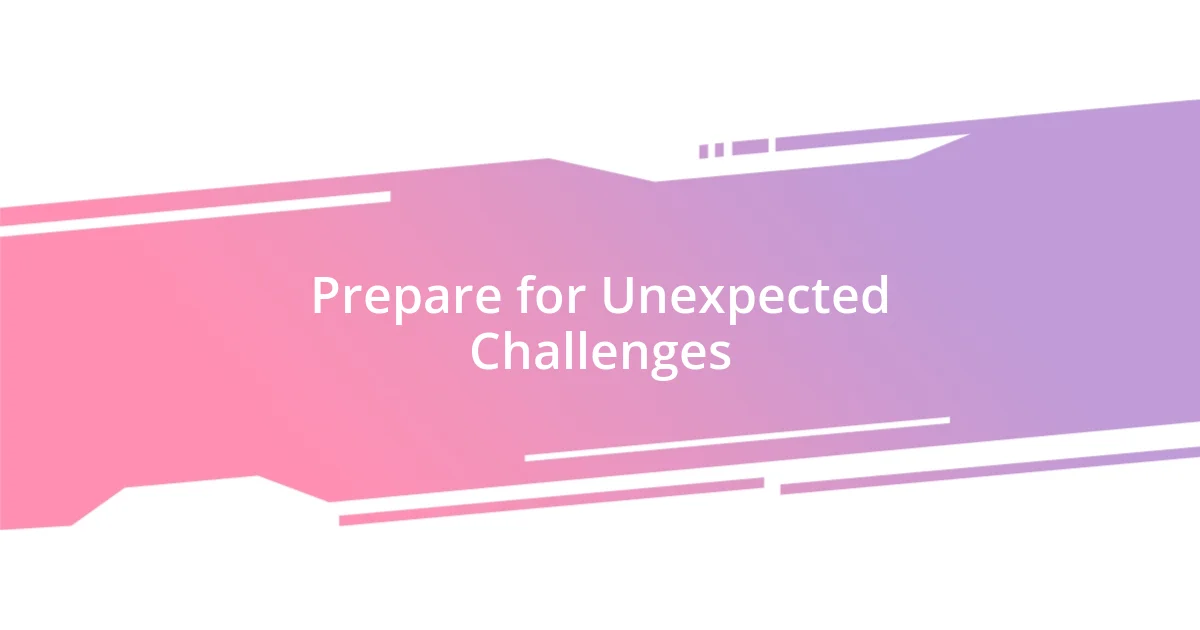
Prepare for Unexpected Challenges
When it comes to preparing for unexpected challenges on the day of the event, I’ve learned that flexibility is key. A few years ago, during an outdoor festival, a sudden downpour threatened our carefully laid plans. Instead of panicking, I quickly pulled together the team, shifting our focus to securing cover for the equipment and attendees. That experience reinforced my belief that being able to adapt in real-time can often turn potential disasters into mere hiccups.
Another lesson I’ve picked up is the importance of having a backup plan. For every major element of your event, consider what could go wrong and strategize accordingly. I vividly recall an instance where our main speaker’s flight was delayed. Thankfully, I’d arranged for a video message just in case, which saved the day and kept the audience engaged. Reflecting on that, I often ask myself: what’s the worst that could happen? By identifying those risks ahead of time, you can build a safety net that offers peace of mind.
Lastly, don’t underestimate the power of a reliable support system. During a past event, my best friend stepped in as an extra set of hands when unexpected technical issues arose. Having someone you trust, who can jump in and handle the chaos with you, can be invaluable. I believe these relationships not only lighten the load but create a collaborative spirit that makes challenges feel surmountable. When you have people ready to tackle issues alongside you, doesn’t that make the entire experience feel more enjoyable?
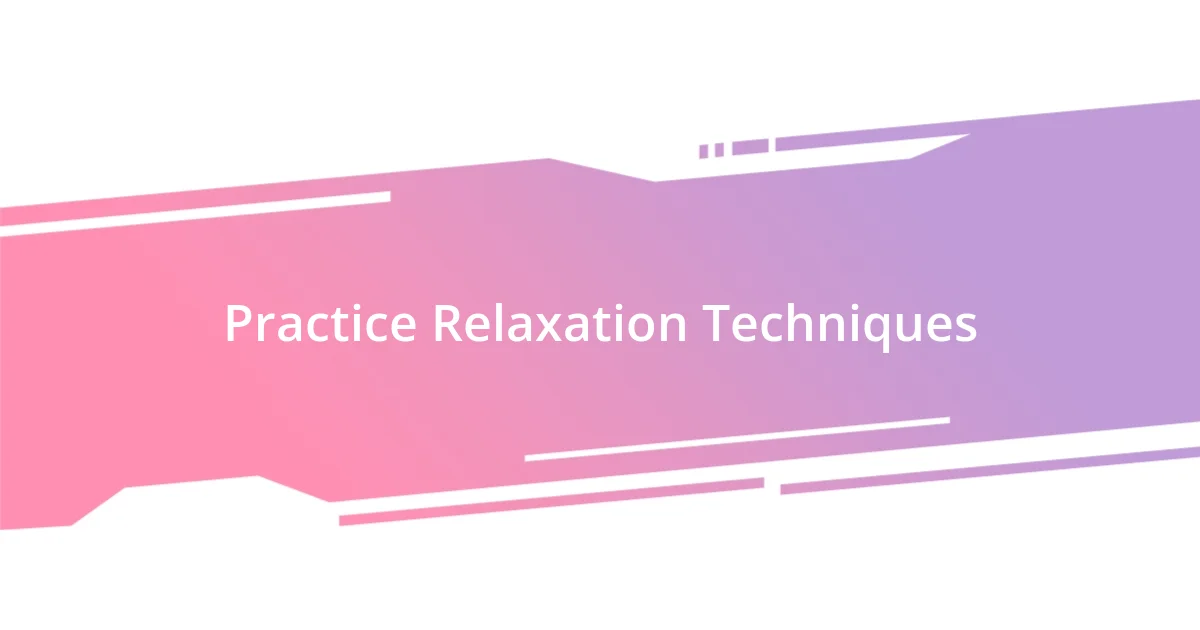
Practice Relaxation Techniques
Practicing relaxation techniques has become a cornerstone of managing my stress on event days. Just last year, moments before a significant conference started, I felt a wave of anxiety wash over me. In those few minutes, I took a deep breath and practiced a simple grounding technique: I focused on my breath, inhaling deeply through my nose and exhaling through my mouth. This quick exercise calmed my racing thoughts and allowed me to approach the event with a clear mind.
I’ve also found that incorporating mindfulness into my preparation really pays off. Whenever I feel tension building, I take a moment to visualize the successful flow of the event. I remember vividly during a charity gala where I took five minutes backstage to picture the laughter, applause, and joyful atmosphere we were aiming to create. That visualization transformed my nervous energy into a sense of purpose, reminding me of why I put in all that hard work. Have you ever tried visualizing a successful outcome? It’s remarkable how it can shift your mindset.
Another technique I highly recommend is progressive muscle relaxation. This method involves tensing and then relaxing different muscle groups to release built-up tension. I remember sitting behind the stage at a wedding I coordinated, where a flurry of last-minute requests had my nerves on edge. I focused on my shoulders, tensing them for five seconds, then releasing and feeling that stress melt away. The contrast of tension and relaxation can truly refocus your energy, allowing you to step into the event feeling rejuvenated instead of overwhelmed. Have you considered how simple practices can have a profound impact on your emotional state?
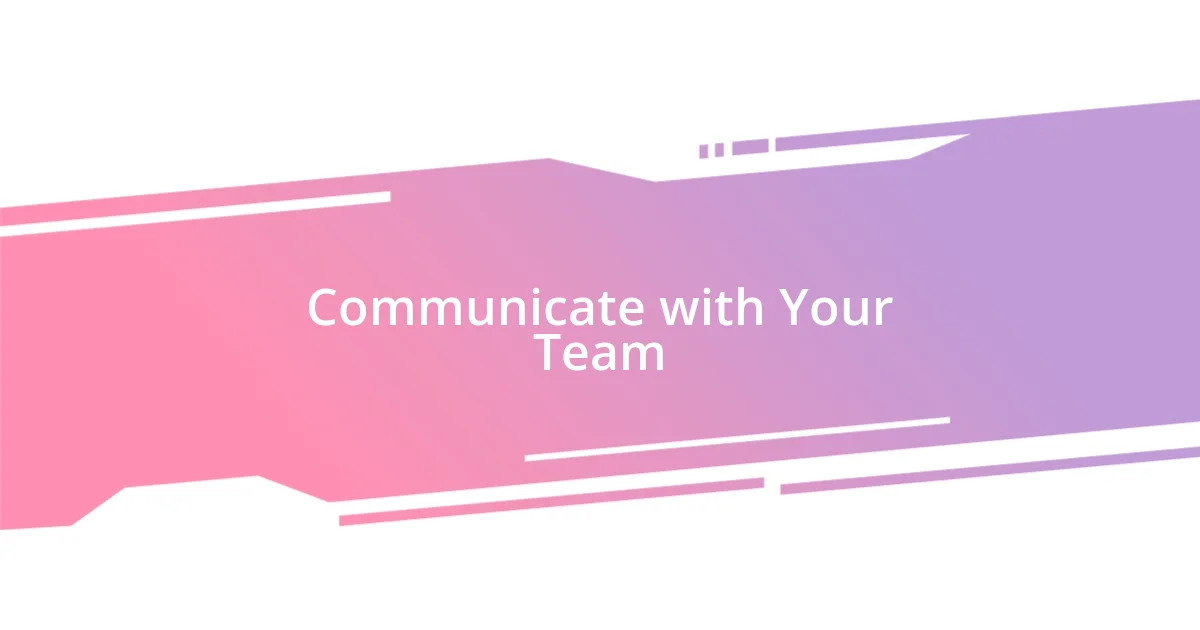
Communicate with Your Team
Open communication with your team on event day can be a game changer. I recall one busy evening at a corporate event when miscommunication nearly led to a scheduling disaster. Just as I was double-checking the agenda, I noticed that the sound engineer hadn’t received the updated list of speakers. A quick team huddle allowed us to realign and address the issue before it escalated, emphasizing how crucial it is to keep everyone on the same page.
Another key insight I’ve gathered is the power of regular check-ins throughout the day. I like to establish simple cues—like a thumbs-up or a nod—to ensure that everything is running smoothly without constant disruption. During a large outdoor concert, these non-verbal signals helped us stay connected amidst the bustling crowd. It’s fascinating how those little moments of connection can ease tension and foster trust among the team.
Have you ever considered how open dialogue can shift the dynamics of a stressful situation? I’ve learned that encouraging my team to share concerns without hesitation cultivates a supportive environment. Once, during a hectic wedding reception, one team member voiced their anxiety about the timeline slipping. We quickly brainstormed solutions, leading to a more efficient flow. This experience made me realize that promoting honest communication not only calms individual nerves but also strengthens our collective problem-solving abilities. Isn’t it reassuring to know that we’re all in it together?

Reflect After the Event
Reflecting after an event is an essential practice that helps me gain perspective on the entire experience. Post-event, I like to carve out some quiet time to jot down my thoughts—what went well and what didn’t. Just last month, after a community festival I organized, I spent an hour reflecting on the day. It was during this time that I recognized the importance of attendee engagement, allowing me to refine my strategies for future events.
I’ve noticed that writing down my reflections often leads to unexpected insights. During one intimate gala I managed, I felt overwhelmed by the little hiccups throughout the night. However, upon reviewing my notes afterward, I realized that those minor issues didn’t detract from the overall joy captured in the guests’ smiles and laughter. This exercise often leaves me pondering—what lessons can I carry forward? It helps me shift my focus from frustration to growth.
Finally, sharing my experiences with fellow event planners adds another layer to my reflection process. Connecting over coffee, I recount stories and gather feedback, which enriches my understanding. I remember discussing a particularly challenging wedding with a colleague who had faced similar hurdles. Her insights on handling last-minute changes opened my eyes to strategies I hadn’t considered before. Does sharing your journey with others help you discover new approaches? It certainly has for me, turning reflection into an opportunity for collaboration and stronger connections.









